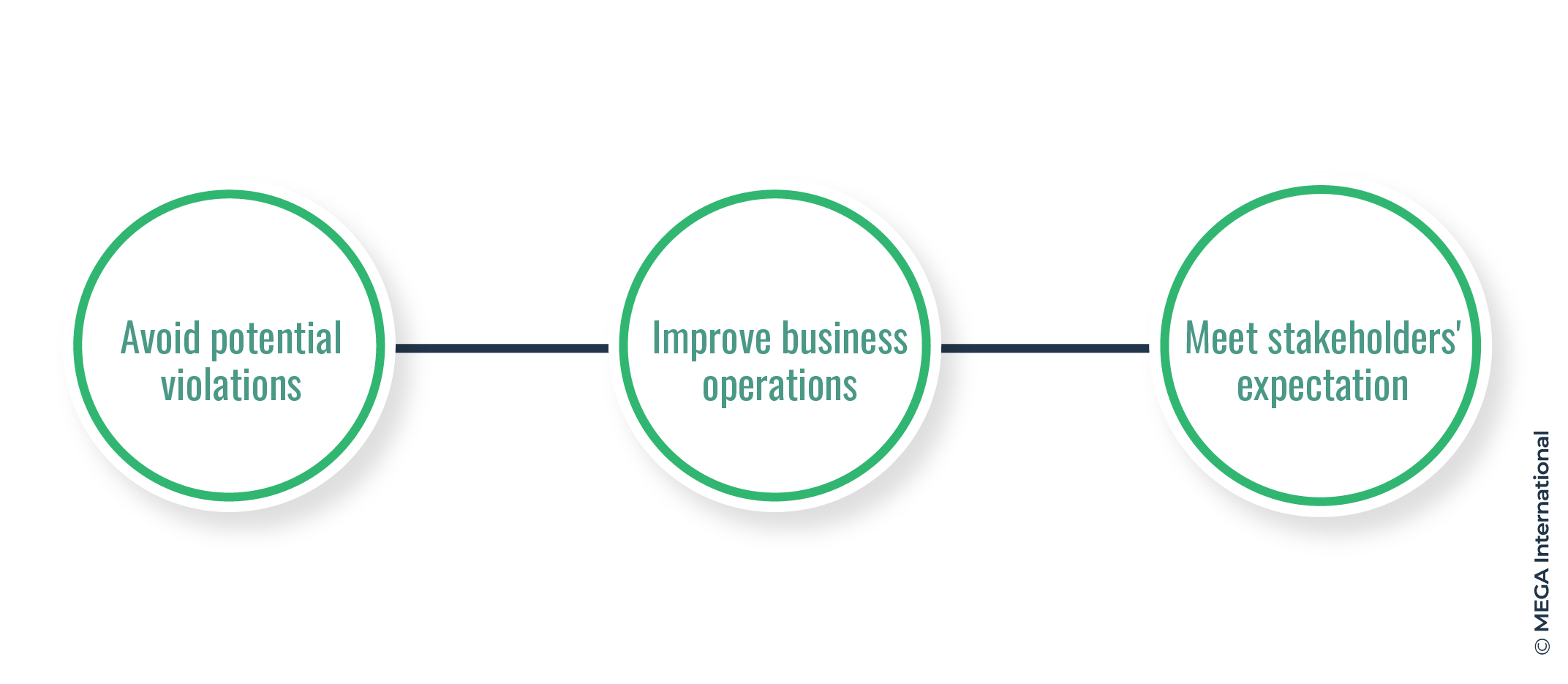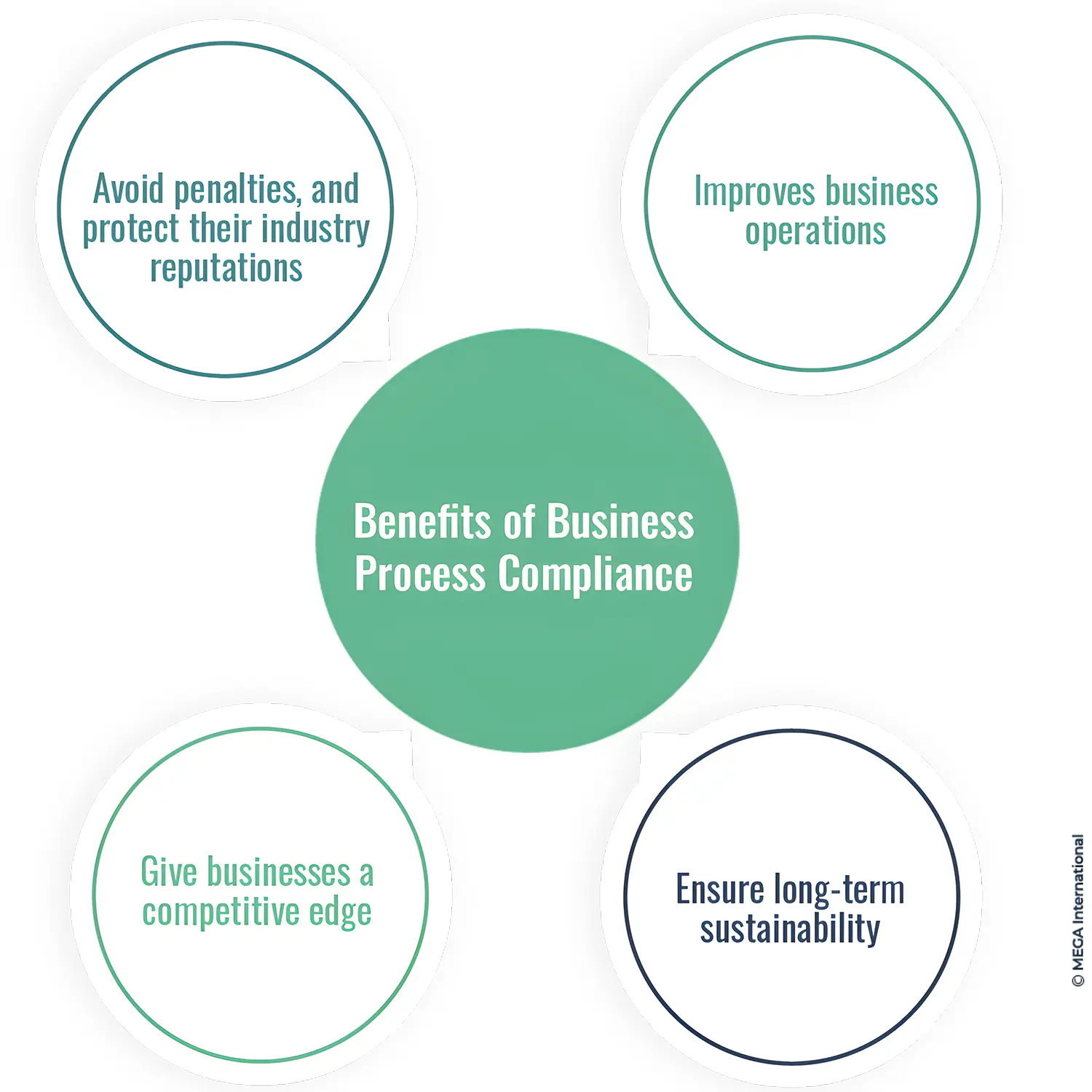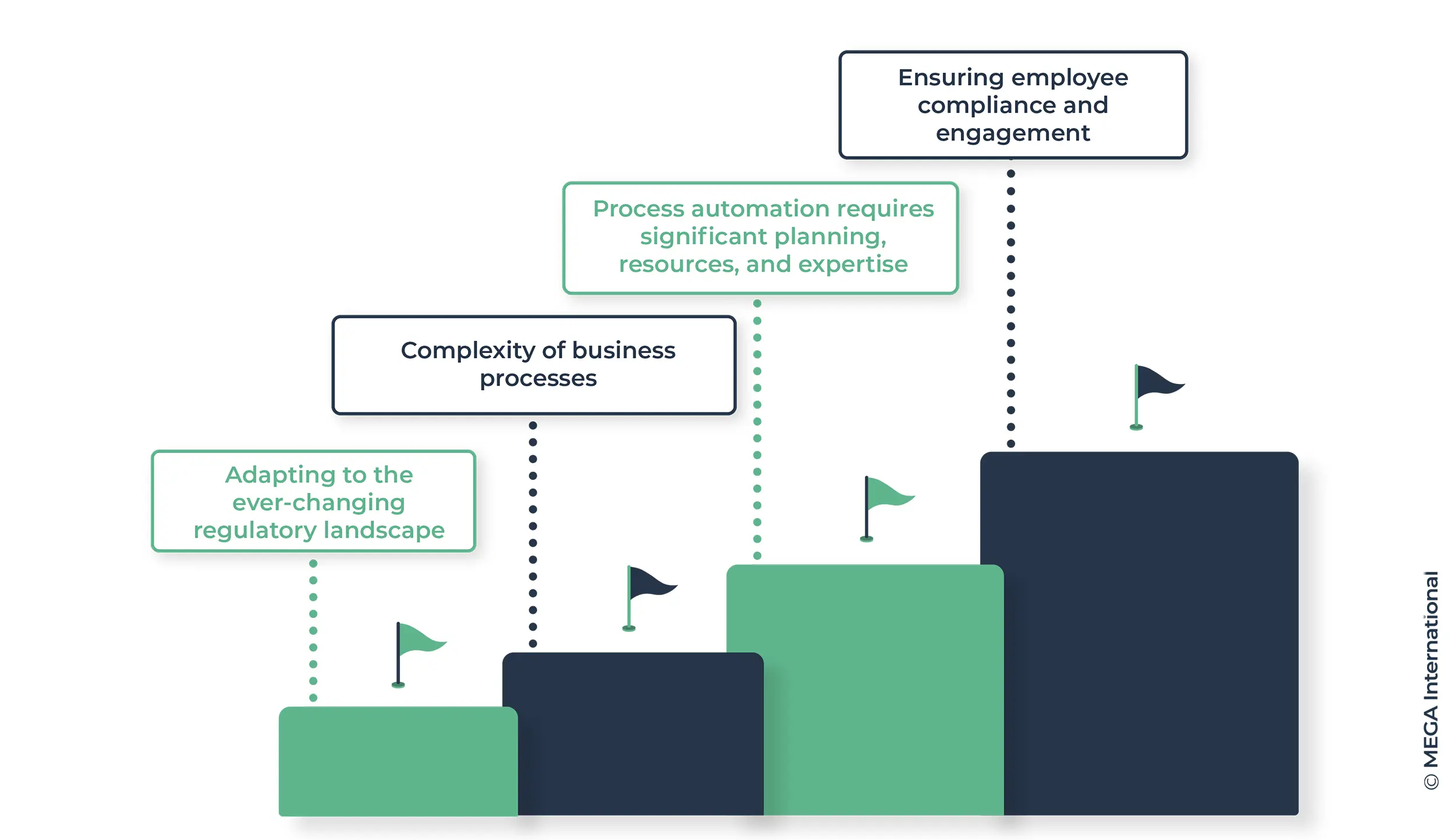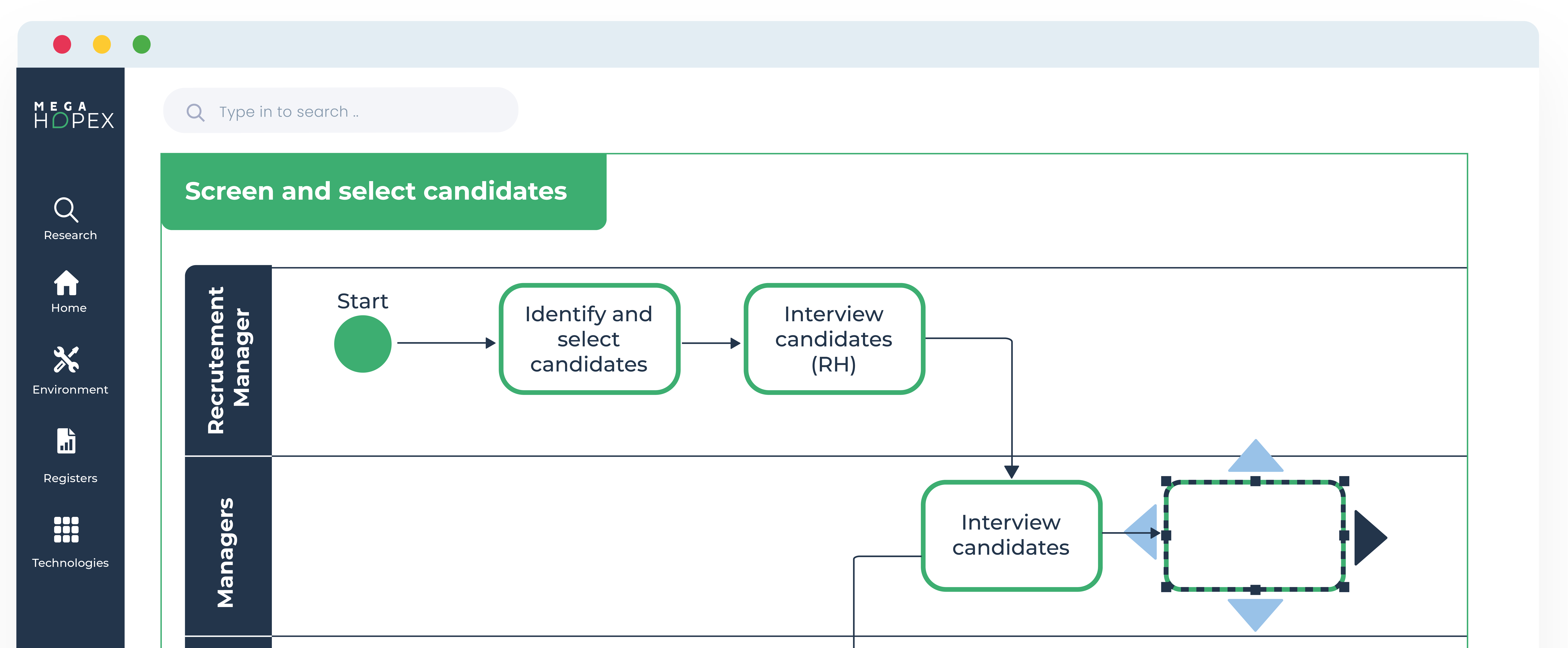
Ensuring Business Process Compliance: Best Practices for Success
Business process compliance is critical to running a successful and ethical company. It involves following regulations and industry standards to ensure all business processes comply.
Compliance with these requirements is essential for avoiding legal issues, maintaining stakeholder trust, and running an efficient organization. This article will explore the importance of business process compliance and how it can be achieved through automation and effective management.
What is Business Process Compliance?
Business process compliance refers to the adherence to policies, regulations, and standards that govern a business's operations. It involves ensuring that all internal and external requirements are met throughout the various stages of a business process.
This can include compliance with legal and regulatory requirements, industry standards, company policies, and ethical guidelines. Business process compliance ensures business operates ethically, mitigates risks, protects customer data, and avoids legal and financial penalties.
Compliance can involve various aspects such as data protection, financial reporting, environmental regulations, health and safety guidelines, labor laws, anti-corruption measures, and more. It requires monitoring, documenting, and auditing business processes to align with the requirements and guidelines.
Non-compliance can result in reputational damage, legal consequences, and financial losses for a business.
The Importance of Compliance
Compliance with regulations, policies, and procedures is vital for any organization. It helps businesses stay on the right side of the law and prevents costly penalties and legal consequences. Compliance also plays a role in maintaining a good reputation and building trust with stakeholders, including customers, employees, and investors.

Business process compliance ensures that all operations within an organization are carried out in a consistent and compliant manner. This includes adhering to industry standards, regulations such as HIPAA (Health Insurance Portability and Accountability Act), and the company's own policies and procedures. By ensuring compliance, businesses can avoid potential violations, improve business operations, and meet stakeholders' expectations.
Why Business Process Compliance is critical to meet regulatory requirements
Process Automation for Compliance
Automation can significantly assist in achieving and maintaining business process compliance. By automating repetitive tasks and workflows, businesses can reduce the risk of human error and ensure that compliance requirements are consistently met. Automation tools can streamline processes, enforce compliance rules, and generate audit trails for accountability.
Implementing a business process management (BPM) system can help organizations automate their processes and ensure compliance. A BPM system enables aligning business processes with organizational goals to improve efficiency and effectiveness. It allows organizations to manage business processes using automation, workflows, task assignation, and monitoring. It also provides a centralized platform for managing compliance-related activities and ensures all stakeholders are accountable for their actions.
Ensuring Compliance through Change Management
Ensuring compliance in business processes often involves implementing or changing new processes. Change management is crucial in successfully implementing these changes and meeting compliance requirements. It involves planning and executing the transition, communicating with stakeholders, training employees, and addressing potential resistance or concerns.
To ensure process compliance during change, it is essential to have a compliance officer or a team of compliance professionals in place. They can oversee the implementation of new processes, conduct compliance audits, and address any compliance issues. These professionals are responsible for monitoring and maintaining the compliance management system and ensuring the company's policies and procedures are up-to-date and effective.
Benefits of Business Process Compliance
Implementing and maintaining business process compliance can bring several benefits to an organization. Businesses can mitigate legal risks, avoid penalties, and protect their reputations by ensuring compliance. Compliance also improves business operations by promoting efficiency, reducing errors, and streamlining processes.

Compliance with industry standards and regulations can give businesses a competitive edge. Many customers and stakeholders prioritize companies committed to ethical practices and regulatory compliance. Compliance also helps organizations adapt and respond to changes in regulations and industry requirements, ensuring long-term sustainability.
Examples of Business Process Compliance
Business process compliance can vary across different industries and regions. For instance, in the healthcare sector, organizations must comply with regulations such as the Health Insurance Portability and Accountability Act (HIPAA). This involves ensuring patient information's confidentiality, integrity, and availability and establishing proper data security measures. Similarly, in the financial industry, organizations must adhere to regulations imposed by governmental bodies and industry standards to prevent money laundering, fraud, and other financial crimes.
Organizations can ensure compliance by implementing a compliance management system encompassing policies and procedures for their industry and business operations. This includes conducting regular compliance audits to identify gaps or improvement areas. Compliance professionals, such as compliance officers, are critical in implementing and overseeing organizational compliance programs.
Challenges of Process Compliance
While process compliance offers several benefits, organizations often face challenges in achieving and maintaining compliance. One of the most common challenges is adapting to the ever-changing regulatory landscape. Regulations and requirements change frequently, and organizations must stay updated to ensure compliance. This requires continuous monitoring, regular audits, and proactive efforts to keep abreast of new compliance requirements.

Another challenge is the complexity of business processes. Organizations often have multiple complex processes that involve various stakeholders, numerous business rules, and interdependencies. Ensuring compliance across these processes can be significant when multiple compliance requirements overlap or conflict.
Automation can help mitigate some of these challenges, but it also brings its own challenges. Implementing process automation requires significant planning, resources, and expertise. It involves carefully analyzing existing processes, identifying opportunities, and selecting the right tools or software. Organizations must also ensure the automation solution complies with relevant regulations and security standards.
Ensuring employee compliance and engagement is another challenge organizations face. Compliance is not just about implementing processes and procedures; it also requires employees' active participation and commitment at all levels. Organizations must invest in training and awareness programs to educate employees about compliance requirements and their role in maintaining compliance. They must also establish a strong compliance culture, where employees are encouraged and rewarded for ethical behavior and compliance adherence.
READ: Business Process Optimization
Summary
Business process compliance is of utmost importance in today's regulatory environment. Businesses must understand and meet compliance requirements to avoid legal issues, maintain stakeholder trust, and improve business operations. Automation and effective management through change and compliance officers are vital in ensuring process compliance. Businesses can achieve and maintain compliance by prioritizing compliance and implementing the necessary tools and processes while improving their overall performance.
FAQs
Business process compliance refers to the adherence and implementation of rules, regulations, policies, and procedures within an organization to ensure that all business activities and processes align with legal requirements and industry standards.
Business process compliance ensures that all operations and activities are carried out standardized and consistently and by regulatory requirements and industry standards. By streamlining and automating processes, businesses can reduce errors, minimize risks, enhance decision-making, and improve operational efficiency.
Compliance professionals are responsible for developing, implementing, and monitoring compliance programs within an organization. They ensure that business processes align with regulatory requirements and industry standards and identify and mitigate any compliance risks or issues that may arise.
Automating process compliance can significantly benefit businesses by reducing manual errors, saving time and resources, enhancing data accuracy and consistency, and improving overall compliance management. Automation enables businesses to streamline compliance processes and ensures all activities are executed according to established rules and regulations.
Compliance audits play a crucial role in business process compliance as they assess the effectiveness of compliance programs and processes within an organization. These audits help identify gaps or non-compliance issues, enabling businesses to take corrective actions and ensure continuous improvement in their compliance efforts.
Compliance management software provides businesses with a centralized platform to manage and track compliance activities. It facilitates the implementation of compliance programs, automates compliance processes, stores compliance-related documentation, and enables real-time monitoring and reporting, thereby supporting effective process compliance management.
Ensuring proper compliance with business functions helps businesses maintain regulatory standards, minimize legal risks, protect their reputation, and build trust with stakeholders. It also promotes operational efficiency, facilitates smooth business operations, and creates a culture of compliance within the organization.
Compliance enforces standardization by establishing and enforcing consistent rules, policies, and procedures that all employees must adhere to. This standardization ensures that activities are carried out in a uniform and compliant manner, reducing variations and enhancing operational efficiency and effectiveness.
Understanding compliance refers to comprehensive knowledge and awareness of regulatory requirements, industry standards, and internal business operations policies and procedures. It involves understanding the obligations and responsibilities of an organization to comply with relevant laws and regulations.
Process compliance management ensures that all business processes align with the organization's goals and objectives. By monitoring and enforcing compliance, businesses can ensure that activities are carried out to support the achievement of desired outcomes and strategic objectives.
Reduce IT complexity and costs while supporting business innovation

Support fast-changing business needs and innovation with a well-designed application portfolio management solution.
Related Content to Business Process Management
Get a clear understanding of how your operation runs, identify areas of improvement, and build scenarios to optimize and transform business processes;
MEGA HOPEX for BPM
Request a demonstration of HOPEX for BPM, and see how you can have immediate value of your projects.






